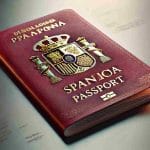The Spanish NIE number (Número de Identificación de Extranjero) serves as a vital legal identifier for non-Spanish citizens residing in Spain. This number is essential for various activities, including:
- Property transactions: Necessary for buying or renting property.
- Banking services: Required to open bank accounts and access financial services.
- Work permits: Fundamental for obtaining employment legally.
Having a valid NIE simplifies bureaucratic processes, making it easier to engage in day-to-day activities while living in Spain. The importance of the NIE cannot be overstated, as it is often one of the first steps towards integrating into Spanish life.
In this article, we will guide you through the step-by-step process of obtaining your NIE number in Spain. Our focus is on ensuring a smooth and hassle-free experience. By understanding each phase of the application process, you can confidently navigate the requirements and secure your NIE card in Spain efficiently.
However, obtaining a NIE is just one part of the puzzle when relocating to Spain. If you’re planning to bring your family to Spain, or if you need to understand the nuances of reporting foreign income or tax residency in Spain, this guide will provide you with all the necessary information.
Additionally, for those interested in working remotely while enjoying the Spanish lifestyle, we also offer insights into Spain’s Digital Nomad Visa, including required documents and application tips for a smooth process.
Understanding the NIE Number
The NIE (Número de Identificación de Extranjero) serves as a legal identifier for non-Spanish citizens residing or engaging in activities within Spain. This unique number is essential for various administrative processes, including opening bank accounts, purchasing property, and applying for work permits.
Key Functions of the NIE Document:
- Identification: The NIE is crucial for anyone who plans to live, work, or study in Spain long-term.
- Documentation: It simplifies bureaucratic processes by consolidating identification requirements into a single number.
NIE vs. DNI
Understanding the differences between the NIE and the DNI (Documento Nacional de Identidad) is important:
- NIE: Issued to non-Spanish citizens, regardless of residency status. Required for foreigners engaging in legal or financial activities.
- DNI: Exclusively for Spanish nationals. It acts as both an identification card and a travel document within the EU.
Both documents are vital; however, the NIE specifically facilitates legal identification for those outside of Spanish citizenship.
Why You Need an NIE Number
The necessity of NIE extends to various essential activities for non-Spanish citizens in Spain. A valid NIE number is crucial for:
- Property Transactions: Whether purchasing or renting, a NIE is required to engage in any property-related dealings. Real estate agencies and notaries will ask for this identification as part of the legal process.
- Banking Services: Opening a bank account in Spain mandates a NIE. Without it, accessing banking services such as transferring funds, obtaining loans, or setting up direct debits becomes impossible.
- Obtaining Health Insurance: Accessing public health services or private insurance often requires presenting your NIE. This identification connects you to the Spanish healthcare system.
- Work Permits: Non-Spanish citizens need a NIE for legal employment in Spain. It is necessary for tax purposes and must be included in work contracts.
In addition to these activities, having an NIE simplifies interactions with Spanish authorities, ensuring compliance with local laws and regulations. The ability to navigate daily life effectively hinges on obtaining this essential identification.
Benefits of Having an NIE Number
Having a Spanish NIE number opens doors to numerous essential services and opportunities for non-Spanish citizens. The benefits of obtaining an NIE are significant:
1. Property Transactions
The NIE is crucial for buying or renting property in Spain. It simplifies the process, allowing for smooth transactions and legal ownership documentation.
2. Utility Setups
Establishing utilities such as electricity, water, and internet requires an NIE. Without it, setting up these essential services becomes challenging.
3. Access to Banking Services
An NIE is necessary for opening bank accounts, applying for loans, or obtaining credit cards. This access facilitates personal finance management while living in Spain.
4. Employment Opportunities
For those seeking employment, the NIE is vital. It ensures compliance with tax obligations, allows for legal work contracts, and makes it easier to navigate complexities like the Beckham Tax Law, which can offer significant tax benefits for expats. Employers often require a valid NIE during hiring processes.
5. Healthcare Access
With an NIE, individuals can obtain health insurance in Spain. This access ensures that both residents and non-residents can receive medical care when needed.
Additionally, having an NIE number allows individuals to contribute to and benefit from the Social Security system in Spain, which provides various benefits including pensions and support for vulnerable groups.
Securing a Spanish NIE number not only eases daily life but also enhances the overall experience of living and working in Spain.
Preparing for Your Application
Gathering the essential documents is a crucial step in obtaining your NIE number. Here’s what you will need:
- Valid Passport: Ensure your passport is current and includes photocopies of the identification page. This document serves as proof of identity.
- EX-15 Form: Complete the EX-15 application form accurately. This form is available online and at local offices. Double-check for any errors or missing information.
- Proof of Purpose: Provide documentation justifying your need for an NIE. This could be an employment contract, property purchase agreement, or any other relevant document that reflects your reason for applying.
Tips for Gathering Documents
- Start collecting these documents well in advance of your appointment to avoid last-minute issues.
- Make sure all photocopies are clear and legible, as unclear copies may lead to delays.
- If English is not your first language, consider seeking assistance from someone fluent in Spanish to help translate any necessary documents or forms.
Being well-prepared with the right documentation will streamline your application process and enhance your chances of a successful outcome.
Common Mistakes to Avoid When Applying for Your NIE Number in Spain
Applying for your NIE number can be straightforward, yet several common pitfalls may complicate the process. Being aware of these can streamline your experience.
Frequent Application Mistakes
- Missing Documents: Ensure you gather all necessary documents before your appointment. Failing to provide required paperwork may lead to delays or outright rejection of your application.
- Incorrect Form Filling: Take time to accurately complete the EX-15 form. Errors in personal details or purpose of application could result in complications.
Navigating Language Barriers
Language differences can also hinder the application process. Consider the following strategies:
- Use Translation Tools: Leverage online translation services or apps for understanding forms and instructions. This can help avoid misunderstandings.
- Seek Assistance: If language is a significant barrier, consider enlisting the help of a bilingual friend or hiring a professional service experienced in Spanish immigration processes.
By focusing on these areas, you enhance the likelihood of a successful application, allowing for a smoother transition into life in Spain.
Step-by-Step Guide to Applying for Your NIE Number in Spain
Step 1: Schedule Your Appointment at Oficina de Extranjeros or Local Police Station
To apply for your Spanish NIE number, the first crucial step is scheduling an appointment. This can be done easily through the official immigration services website. Here’s how:
- Visit the Official Website:
- Navigate to the “Cita Previa” section, which is specifically designed for appointment scheduling.
- Ensure you select your preferred language option if available.
- Select Your Office:
- Choose either the Oficina de Extranjeros or a local police station based on your location.
- If you’re unsure which office to select, consider proximity and convenience.
- Fill Out Required Information:
- Provide necessary details such as your personal information and reason for obtaining the NIE.
- Confirm that all information entered is accurate to avoid delays.
- Choose a Date and Time:
- The system will display available dates and times.
- Select a slot that fits your schedule while keeping in mind potential wait times.
- Confirmation:
- After booking, you will receive a confirmation email or message with your appointment details.
- Keep this confirmation handy as you’ll need it for your visit.
In cases where you encounter difficulties with the online system, alternative methods exist:
- Phone Booking: Some regions allow appointments to be scheduled via phone. Look up the contact number for your local immigration office and inquire about availability.
- In-Person Visits: If online and phone options are not viable, visiting the office directly may yield results. Be prepared for potential waiting times.
- Assistance Services: Consider engaging with legal or immigration services that specialize in helping individuals obtain their NIE numbers. They can facilitate booking appointments and provide guidance during the process.
Scheduling your appointment effectively sets the foundation for a smooth application process. Ensuring that you have taken care of this step can significantly reduce stress later on when gathering required documents and attending your appointment at the Oficina de Extranjeros or local police station.
Step 2: Gather Required Documents for Your Appointment
Preparing the necessary documents is crucial when you apply for your NIE in Spain. Having everything in order will streamline the process at your appointment with the Oficina de Extranjeros or local police station. Here’s a checklist of essential documents to gather:
- Valid Passport: Ensure your passport is current and bring photocopies.
- Completed EX-15 Form: This form can be filled out online or obtained at the office.
- Passport Photographs: Bring recent, passport-sized photos that meet official specifications.
- Payment Receipt: Proof of payment for the NIE application fee, typically around €9.84, must be presented.
Tips for Effective Preparation:
- Double-check all documents for completeness and accuracy. Missing paperwork can lead to delays.
- Organize your documents in a folder, making them easy to access during your appointment.
- Consider keeping photocopies of all submitted documents for your records.
Attention to detail during this stage enhances your chances of a smooth experience when applying for your NIE number in Spain. Understanding the significance of each document ensures you’re well-prepared to navigate the immigration services effectively.
Step 3: Attending Your Appointment at Oficina de Extranjeros or Local Police Station
When you arrive at the Oficina de Extranjeros or local police station for your NIE application, be prepared for a structured process. Here’s what to expect:
1. Check-in Process
Upon arrival, locate the check-in desk. You may need to present your appointment confirmation and identification.
2. Waiting Time
Expect some waiting time. Bring a book or something to occupy your time. Being patient is key during this period as delays can occur.
3. Documentation Review
When called, an official will review your documents. Ensure you have all required items ready, including:
- Completed EX-15 form
- Proof of tax payment
- Valid passport and copies
- Passport-sized photographs
4. Communication Records
Keep records of any communication with immigration services. This includes notes on what was discussed and any reference numbers provided.
Handling unexpected situations is part of the experience. If an issue arises—such as missing documentation or language barriers—remain calm. Consider having a Spanish-speaking friend accompany you if needed.
This appointment is crucial in your journey to obtain a Spanish NIE number. Following these tips helps ensure everything runs smoothly as you navigate this important step in the process.
Additional Considerations When Obtaining Your Spanish NIE Number
Obtaining your NIE number opens the door to various other visa options that may better suit your circumstances. Consider the following alternatives:
- Work Permits: If you plan to work in Spain, securing a work permit may be necessary. This process often requires an employer to sponsor your application, demonstrating that no local candidates fulfill the role.
- Golden Visa: The Golden Visa program is designed for non-EU citizens who invest a significant amount in Spain. This option provides residency rights and is an attractive choice for those looking for long-term residency without needing to reside in Spain continuously.
- Student Visas: For individuals pursuing education in Spain, applying for a student visa is essential. This visa allows you to study at recognized institutions while also providing opportunities for limited work hours.
- Digital Nomad Visas: Recently introduced, this visa caters to remote workers wishing to live in Spain while working for non-Spanish companies. It offers flexibility and a unique lifestyle experience. You can explore more about Spain’s Digital Nomad Scheme including eligibility and application process. Moreover, this visa can lead to long-term residency, which is beneficial for remote workers seeking stability.
Understanding these options enhances your ability to navigate life in Spain effectively, ensuring you choose the path that aligns with your plans and needs.
FAQs About the Spanish NIE Number
Common Questions About Spanish NIE Number
- What is the purpose of the NIE number?
- The NIE (Número de Identificación de Extranjero) serves as a unique identification for non-Spanish citizens in Spain. It is essential for activities such as opening bank accounts, signing contracts, and engaging in property transactions.
- Do I need an NIE number if I plan to stay temporarily?
- Yes, even for short stays, having an NIE can facilitate various processes like purchasing property or setting up utility services.
- What should I do if my NIE application is denied?
- If denied, you can request a review of your case. It’s crucial to understand the reasons for denial, which may involve missing documentation or incorrect information. Gathering proper documentation and resubmitting within a specified time frame is essential.
- Can I apply for an NIE number online?
- While certain preliminary steps can be completed online, such as scheduling appointments, the application itself must be finalized in person at designated offices.
- Is the NIE number valid indefinitely?
- Yes, once issued, your NIE number remains valid indefinitely. Keeping photocopies of all documents related to your application is advisable for future reference.
Costs and Processing Times for Your Spanish NIE Number Application
Obtaining your Spanish NIE number involves specific costs and varying processing times. Understanding these details can help you plan accordingly.
Typical Application Fees
- Standard Fees: The cost for applying for a Spanish NIE typically ranges from €10.71 to €15.
- Payment Method: This fee is paid through Form 790 at banks or ATMs prior to your appointment.
Processing Times
- Average Wait Times: Processing times can vary widely based on the workload at different offices. Applicants often experience delays, with wait times ranging from a few days to several weeks.
- Expedited Options: Some offices may offer expedited processing for an additional fee, allowing for quicker issuance of your NIE.
Important Notes
- It is advisable to keep receipts of your payments and any submitted documents.
- Processing times may be influenced by factors such as local demand and time of year.
Being informed about these costs and timelines can streamline your application process, enhancing your experience in securing a Spanish NIE number.












